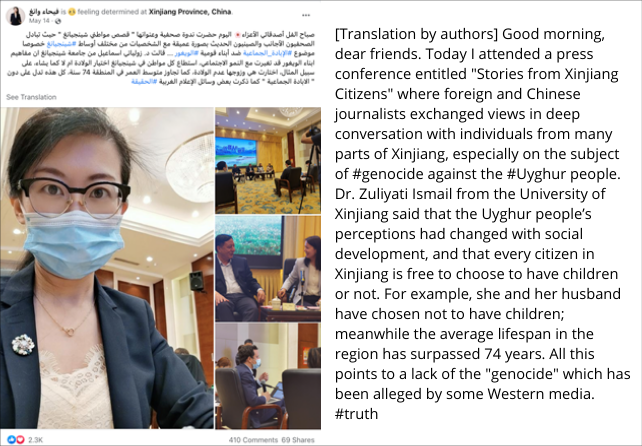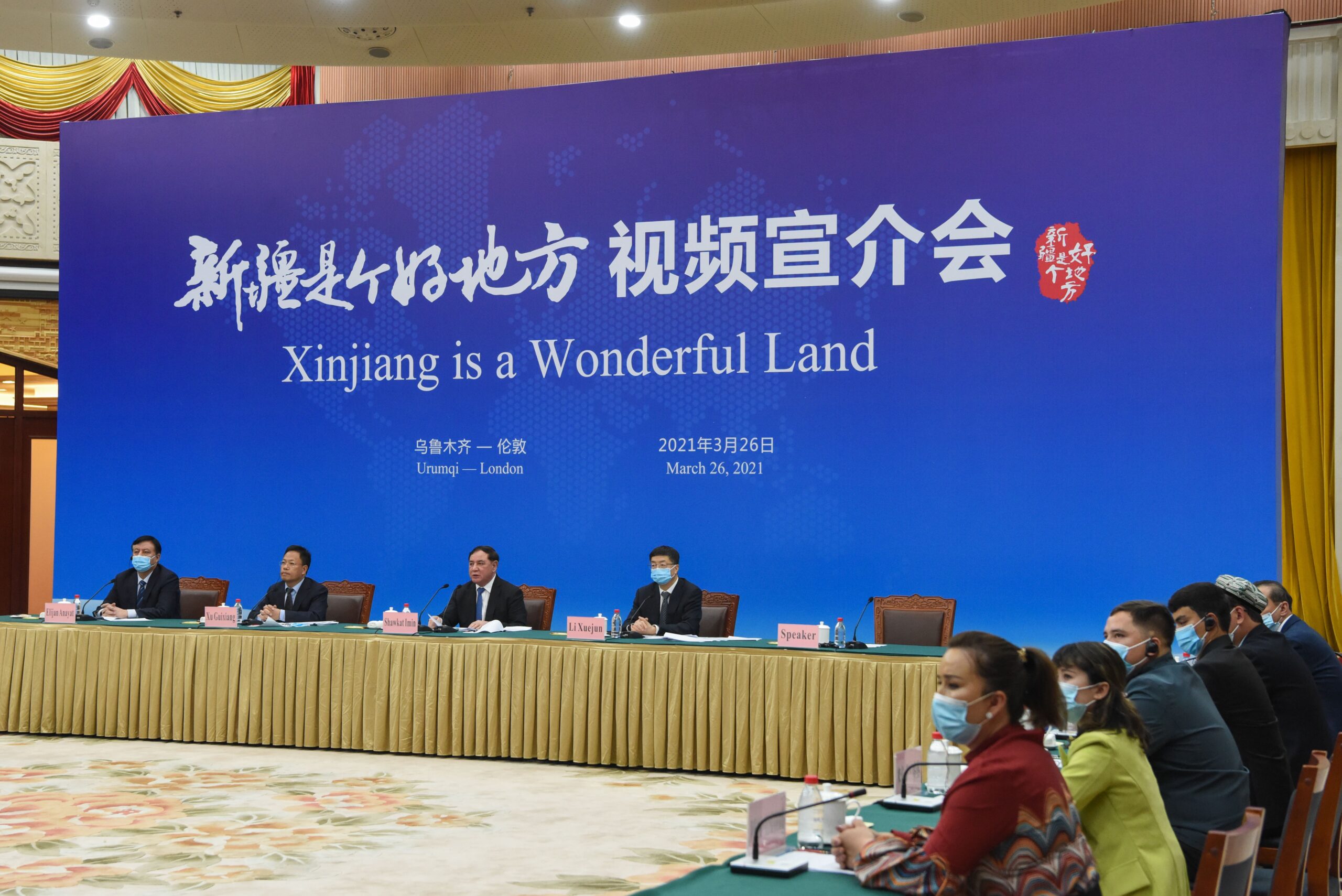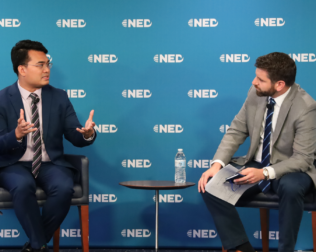By Nick Monaco and Colin Eide
“I recently saw on the news that people outside the country are claiming that we’re being forced to work—this is a lie. Is there something wrong with motivated people like me going out and seeking work? […] These people’s political goal is to keep us unemployed and poor.”
– Yusupjan Yasinjan, ethnic Uyghur speaker at the Chinese Embassy in Egypt’s “Xinjiang is a Wonderful Place” conference, 30 June 2021
For anyone paying attention to China’s northwest region of Xinjiang in the last decade, it is clear that something truly horrific has been happening. Members of China’s Uyghur community, a predominately Muslim ethnic minority group, have fallen under the world’s most invasive digital and physical surveillance regime, been targeted by hacking campaigns, forcibly assimilated, detained in concentration camps, subjected to forced labor, and, often times, simply disappeared altogether. Proof of mass atrocities has accumulated in recent years, including photographs of concentration camps and multiple leaks of internal government documents encouraging Chinese Communist Party (CCP) officials to “round up all those who deserve to be” and show “absolutely no mercy” to Uyghur detainees. All this has been enough for several governments around the world to formally brand China’s actions as genocide. Despite the growing body of evidence, China continues to insist that any claims of human rights abuses in Xinjiang amount to “the lie of the century.” Statements like Yasinjan’s at the press conference in Egypt are meant to promote the CCP line that the West is “using Xinjiang to curb China” (以疆制华).
As evidence of this mass atrocity has grown, so too has Beijing’s disinformation and propaganda that denies and obscures its culpability. These narratives are at times so rosy as to border on parody. Generally, the CCP has simply asserted that “Xinjiang is a wonderful place.” As risible as this sentiment is, we should not underestimate the malice behind it, nor the serious harm it is actively causing Uyghurs in Xinjiang. Under this tagline, the People’s Republic of China (PRC) spent the better part of 2021 holding a series of press conferences targeting the Muslim world in a concerted effort to convince the Uyghurs’ fellow Muslims around the world that, despite what they may have heard, nothing bad is happening in Xinjiang. These conferences have also received covert promotion on social media from PRC-affiliated influencers, megaphoning the lie that no Uyghurs are being harmed in Xinjiang to an even wider audience.
From Woeful to Wonderful: How the CCP Whitewashes Its Crimes in Plain Sight
Egypt has been a primary target of the PRC’s influence campaign. The PRC Embassy in Egypt and the provincial government of Xinjiang jointly hosted a video conference entitled “Xinjiang is a Wonderful Place” on June 30, 2021. In addition to several CCP officials, high-profile Egyptian officials were also among the speakers and attendees.
Marcel Samir, an al-Tagammu’ party MP, is one notable example. She complained that the United States had “ignored the achievements” of the PRC in Xinjiang. Al Ahram journalist Mahmoud Sa’d Diab (another, perhaps more concerning example) used his speech at the event to extol the virtue of Xinjiang’s cotton, cheeses, and fruits—simply ignoring the credible accusations of forced labor in the region. Unfortunately, Mr. Diab is only a symptom of China’s particularly successful courtship of Egypt’s journalists. Sponsored vacations and the inclusion of Al Ahram—the country’s most widely circulated daily—as a member of Beijing’s Belt and Road News Network (BRNN) evince the CCP’s charm offensive in Egypt and beyond.
Over the course of the three-hour conference, several Uyghurs made online video presentations, taking great pains to emphasize the high standard of living they enjoyed in Xinjiang. Yusupjan Yasinjan was one prominent speaker, a Uyghur from Xinjiang who formerly worked at Ofilm, a camera and smartphone parts manufacturer with which Apple cut ties in March 2021 over allegations of forced labor. Yasinjan detailed the great working conditions at Ofilm: Workers were given free lodging, halal food, and the company “respected [their] customs.” Yasinjan showed large photographs of himself with friends who visited during his time at Ofilm, claiming his friends were “envious” of his lifestyle.
Near the end of his speech, however, Yasinjan’s tone moved from glowing to searing, as he pivoted to talking about “foreign” news outlets’ reports of human rights abuses and forced labor in Xinjiang. Yasinjan proclaimed these news reports as entirely false and part of a master plot to oppress Uyghurs, keep them unemployed, and prevent the economic development of Xinjiang.
Yasinjan is only one of a handful of Uyghurs the government and state media apparatus promote enthusiastically, both at home and abroad, as part of their attempts to deny the atrocities taking place in Xinjiang.
There was nothing extemporaneous about Yasinjan’s speech. As his eyes moved left to right with the text he was reading, it was clear that his speech had been pre-prepared down to the letter. Many of the statements were direct quotes from previous remarks he made during a press conference on Xinjiang held by China’s Ministry of Foreign Affairs (MFA) in early February 2021, nearly four months before the Egypt-focused event. Yasinjan’s presentation at another MFA Xinjiang press conference last September, two months after the Egypt event, was virtually identical to the one in Egypt and reprinted in a People’s Daily article entitled “The People of Xinjiang Expose Western Politicians’ Lies: Their Plot Won’t Succeed.” The government has organized more than sixty such “press conference[s] on Xinjiang-related issues” in 2021 alone, all with similar narratives.
Outside his participation in the Egyptian “Xinjiang is a Wonderful Place” conference, Yasinjan has spoken at other government press conferences, appeared in PRC embassy press statements around the world, and been featured far-and-wide in China’s state-owned media, such as, Xinhua, CCTV, China Daily, China Radio International, Beijing Daily, Guangming Daily, the People’s Daily, Southeast Net, Zhejiang Online, and Tianshan Net. Headlines of these articles uniformly ridicule the notion that human rights abuses are taking place in Xinjiang. One headline claimed that Yasinjan and others “refute[d] the malicious lies smearing China.”
Yasinjan is only one of a handful of Uyghurs the government and state media apparatus promote enthusiastically, both at home and abroad, as part of their attempts to deny the atrocities taking place in Xinjiang. Other, similarly hand-picked Uyghurs often repeat the same lines in their testimonies as Yasinjan used in Egypt. Subinur Mamtmin, a Uyghur who claimed China’s re-education center “gave [her] a new life,” made sure to mention the identical list of appliances that were provided by her employer in another “Xinjiang is a Wonderful Place” conference.
Support from the Shadows: Unlabeled Government Affiliates Promote the CCP’s Xinjiang Propaganda Online
China’s state media and government offices have publicized their extensive propagandistic events widely, but the “Xinjiang is a Wonderful Place” conferences have also received more subtle promotion from influencers who do not disclose their ties to state-owned media. Our team at Miburo discovered that these influencers have extensive reach: They produce content in 38 languages to target over 180 countries, and boast over 67 million followers.
Fayhaa Wang (王馨 in Chinese; فيحاء وانغ in Arabic), a Chinese lifestyle influencer who speaks fluent Arabic, is among these influencers. She has lived in Egypt, spreads China’s state-media content in Arabic, and has over 1.5 million followers on Facebook, Instagram, Twitter, TikTok, and YouTube combined. Though on some platforms Wang is not labeled as such, she is an employee of China Radio International (CRI), a state-owned outlet that is a key pillar of China’s Grand Overseas Propaganda campaign (大外宣). Wang posted a link to the live stream of the Egypt conference on her Facebook page. The video, which received over 6,000 views and hundreds of comments and interactions, is not the only post in which Wang has denied mass atrocities in Xinjiang. Last May, after attending a “Stories from the Xinjiang Citizens” press briefing, Wang proclaimed that the event’s discussion “points to a lack of ‘genocide’ which has been alleged by some Western media.” The post is still up on her social media profile (see image below).

Reading from a Broader Playbook of Propaganda and Disinformation, and How to Address It
As governments around the world have begun imposing sanctions on CCP officials and formally recognizing what is taking place in Xinjiang as genocide over the past year, the CCP’s state propaganda campaign to deny these charges has become much more aggressive. Beijing’s efforts include both overt propaganda, such as the series of “Xinjiang is a Wonderful Place” conferences held throughout the Muslim world, and more covert messaging, such as using influencers or fake accounts to disseminate messaging denying genocide on Facebook, Twitter, and YouTube. The PRC has used this playbook in several Muslim-majority nations, such as Indonesia, Iran, Malaysia, Pakistan, and Turkey with some success. One notable example is Pakistan, where Qassim Suri, the Deputy Speaker of the National Assembly, attended the conference and even parroted the CCP line, praising Xinjiang’s recent economic development and disavowing the “false propaganda” of the West. The PRC has hosted similar conferences in non-Muslim majority countries as well, including Australia, Belgium, Canada, France, Germany, Italy, Japan, Russia, Switzerland, and the United States. Everywhere you look, the CCP is actively denying its crimes to anyone who will listen.
The CCP is on the offensive to whitewash its actions in Xinjiang, supercharging its censorship efforts with proactive disinformation campaigns around the world.
In past years, China has done its best to control information and narratives about Xinjiang abroad through a combination of sharp power tactics, censorship, and economic pressure. In 2015, it forced French journalist Ursula Gauthier out of the country by not renewing her press credentials as a consequence of her reporting in Xinjiang. In Taiwan, PRC officials strong-armed media outlets into removing Xinjiang-focused coverage to gain access to the vast media market within mainland China. Beijing has also used similar economic incentives to buy silence from powerful Middle Eastern countries, such as Saudi Arabia, the United Arab Emirates, and Qatar. These actions have bought obedience: Muslim-majority countries such as Egypt, Saudi Arabia, and the United Arab Emirates have all extradited Uyghurs to China at the CCP’s behest since the full-scale repression in Xinjiang began. Beijing’s actions in the last year, however, signal a more aggressive shift in policy: the CCP is on the offensive to whitewash its actions in Xinjiang, supercharging its censorship efforts with proactive disinformation campaigns around the world.
In her Nobel Peace Prize acceptance speech last year, Philippine journalist Maria Ressa made clear that democracy is imperiled when disinformation is allowed to thrive unchecked. There are several ways by which we can amplify the truth to counter the CCP’s aggressive disinformation campaigns to whitewash its genocide in Xinjiang. First, social media platforms must do a better job of labeling China’s state media and its affiliates as such—our own work, along with other investigations, have shown Facebook and Twitter as inconsistent in labeling accounts with such disclaimers, particularly when affiliates are White or post in a language other than English. Recent research has suggested these labels help curb the early spread of disinformation. Facebook should also implement stronger crackdowns on “auto-liker” cyborg accounts, which falsely inflate the popularity of China’s state media outlets on its platform. In 2019, China’s state media outlets accounted for five of the six most popular news pages in the world on Facebook (which is banned in China); and according to Sophie Zhang, a Facebook whistleblower and former employee, many of these Facebook pages’ likes and follows originate from fake accounts.
Civil society groups in the Muslim and Arab world should ramp up pressure on both businesses and governments to speak out against the CCP’s ongoing atrocities against the Uyghurs.
Second, civil society groups in the Muslim and Arab world should ramp up pressure on both businesses and governments to speak out against the CCP’s ongoing atrocities against the Uyghurs. Many have already started to do so. Since September 2021, more than forty Muslim civil rights organizations have boycotted Hilton since reports that it was building a hotel on the remains of a torn-down mosque in Xinjiang. International coordination among human rights NGOs will exert much-needed pressure on those in power who are unwilling to speak out. Investigative research holds this power as well. Reports exposing supply chain abuses have pushed multinational corporations to extricate Xinjiang forced labor from supply chains successfully. Research into government tenders and budgetary documents forced the CCP itself to change its tune in 2018 and admit the existence of “re-education camps,” a reversal of its previous policy of denial.
Finally, lawmakers in liberal democracies have a responsibility to stymie the flow of both on- and offline propaganda campaigns by pushing for reforms such as better implementing the United States Foreign Agents Registration Act (FARA), a law the U.S. originally passed to curb Nazi propaganda targeting Americans during World War II. Laws like Taiwan’s recent Anti-Infiltration Act were inspired in part by FARA’s successes. Liberal democracies can also live up to their foundational values by continuing to publicize evidence of human rights abuses in Xinjiang. Without these countermeasures, there is scant hope of ending mass atrocity in Xinjiang or the spread of Beijing’s disinformation about it.
Nick Monaco is chief innovation officer and director of China research at Miburo, a disinformation research and analysis company. Colin Eide is director of analysis at Miburo and leads its Middle East and North Africa research effort. Follow them on Twitter at @_NickMonaco and @_Eide.
The views expressed in this post represent the opinions and analysis of the authors and do not necessarily reflect those of the National Endowment for Democracy or its staff.
Image Credit: Ding Lei/Xinhua via Getty Images






